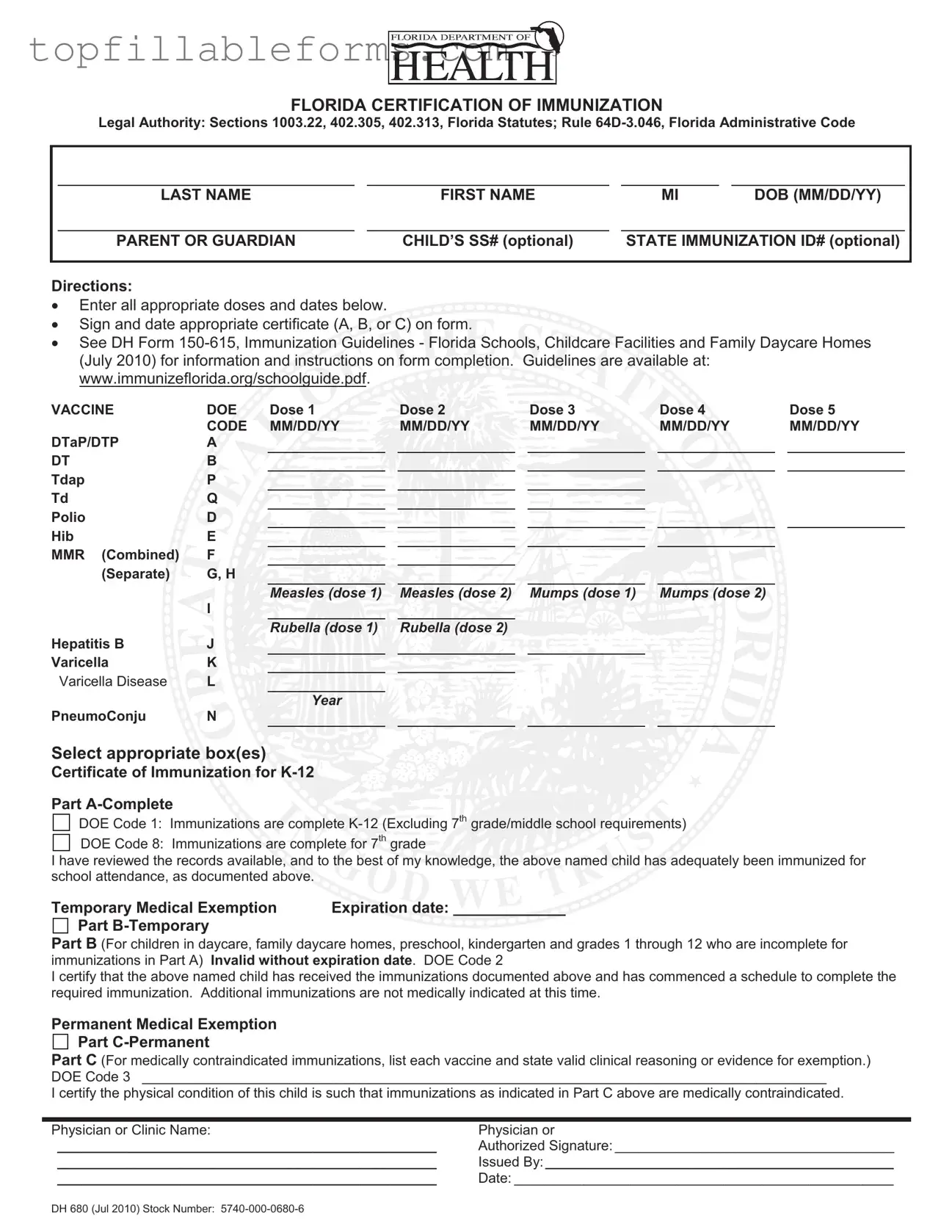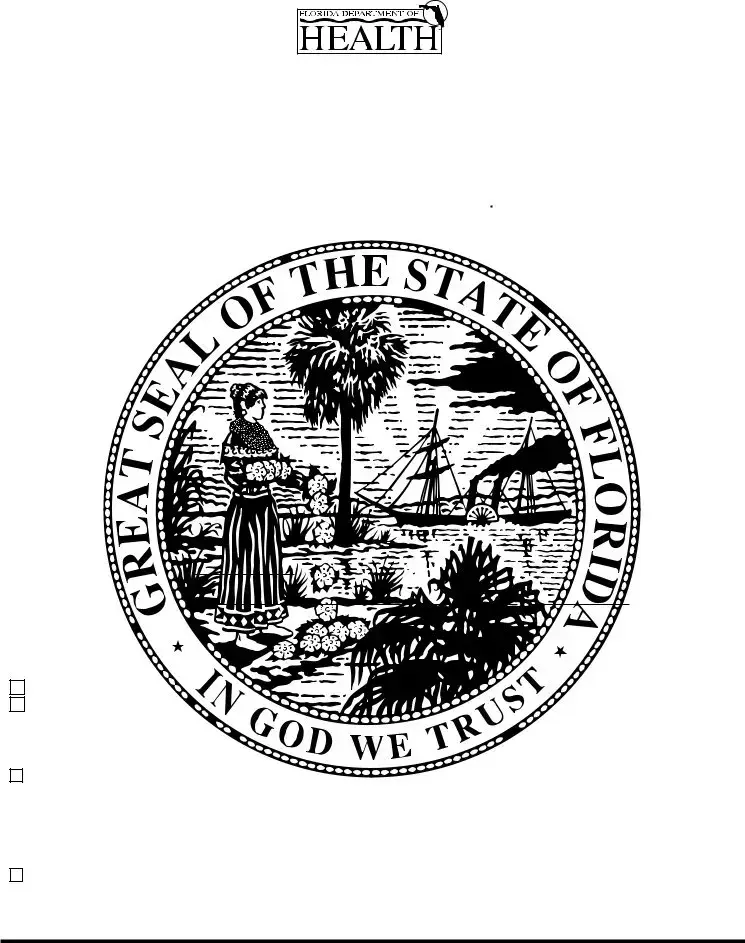FLORIDA CERTIFICATION OF IMMUNIZATION
Legal Authority: Sections 1003.22, 402.305, 402.313, Florida Statutes; Rule 64D-3.046, Florida Administrative Code
|
|
|
|
|
|
|
|
|
|
LAST NAME |
|
FIRST NAME |
|
MI |
|
DOB (MM/DD/YY) |
|
|
|
|
|
|
|
|
|
|
PARENT OR GUARDIAN |
|
CHILD’S SS# (optional) |
|
STATE IMMUNIZATION ID# (optional) |
|
|
|
|
|
|
|
|
|
|
Directions:
Enter all appropriate doses and dates below.
Sign and date appropriate certificate (A, B, or C) on form.
or C) on form.
See DH Form 150-615, Immunization Guidelines - Florida Schools, Childcare Facilities and Family Daycare Homes (July 2010) for information and instructions on form completion. Guidelines are available at: www.immunizeflorida.org/schoolguide.pdf. 










VACCINE |
DOE |
Dose 1 |
|
Dose 2 |
|
Dose 3 |
|
Dose 4 |
|
Dose 5 |
|
CODE |
MM/DD/YY |
|
MM/DD/YY |
|
MM/DD/YY |
|
MM/DD/YY |
|
MM/DD/YY |
DTaP/DTP |
A |
|
|
|
|
|
|
|
|
|
DT |
B |
|
|
|
|
|
|
|
|
|
|
|
|
|
|
|
|
|
|
Tdap |
P |
|
|
|
|
|
|
|
|
|
Td |
Q |
|
|
|
|
|
|
|
|
|
Polio |
D |
|
|
|
|
|
|
|
|
|
|
|
|
|
|
|
|
|
|
Hib |
E |
|
|
|
|
|
|
|
|
|
|
|
|
|
|
|
|
|
|
MMR (Combined) |
F |
|
|
|
|
|
|
|
|
|
|
|
|
|
|
|
|
|
|
(Separate) |
G, H |
|
|
|
|
|
|
|
|
|
|
|
|
|
|
|
|
|
|
|
|
|
|
|
|
|
|
|
|
|
|
|
Measles (dose 1) |
|
Measles (dose 2) |
|
Mumps (dose 1) |
|
Mumps (dose 2) |
|
|
|
I |
|
|
|
|
|
|
|
|
|
|
|
|
|
|
|
|
|
|
|
|
|
|
Rubella (dose 1) |
|
Rubella (dose 2) |
|
|
|
|
|
|
Hepatitis B |
J |
|
|
|
|
|
|
|
|
|
Varicella |
K |
|
|
|
|
|
|
|
|
|
|
|
|
|
|
|
|
|
|
Varicella Disease |
L |
|
|
|
|
|
|
|
|
|
|
|
|
|
|
|
|
|
|
Year
PneumoConju N
Select appropriate box(es)
box(es)
Certificate of Immunization for K-12
K-12
Part A-Complete
DOE Code 1: Immunizations are complete K-12 (Excluding 7th grade/middle school requirements)
DOE Code 8: Immunizations are complete for 7th grade
are complete for 7th grade
I have reviewed the records available, and to the best of my knowledge, the above named child has adequately been immunized for school attendance, as documented above.
and to the best of my knowledge, the above named child has adequately been immunized for school attendance, as documented above.


Temporary Medical Exemption |
Expiration date: _____________ |
Part B-Temporary |
|
Part B (For children in daycare, family daycare homes, preschool, kindergarten and grades 1 through 12 who are incomplete for immunizations in Part A) Invalid without expiration date. DOE Code 2
I certify that the above named child has received the immunizations documented above and has commenced a schedule to complete the required immunization. Additional immunizations are not medically indicated at this time.
Permanent Medical Exemption
Part C-Permanent
Part C (For medically contraindicated immunizations, list each vaccine and state valid clinical reasoning or evidence for exemption.) DOE Code 3 ________________________________________________________________________________________
I certify the physical condition of this child is such that immunizations as indicated in Part C above are medically contraindicated.
Physician or Clinic Name: |
Physician or |
_________________________________________________ |
Authorized Signature: ____________________________________ |
_________________________________________________ |
Issued By:_____________________________________________ |
_________________________________________________ |
Date: _________________________________________________ |



 or C) on form.
or C) on form.










 box(es)
box(es)
 K-12
K-12 are complete for 7
are complete for 7 and to the best of my knowledge, the above named child has adequately been immunized for school attendance, as documented above.
and to the best of my knowledge, the above named child has adequately been immunized for school attendance, as documented above.

